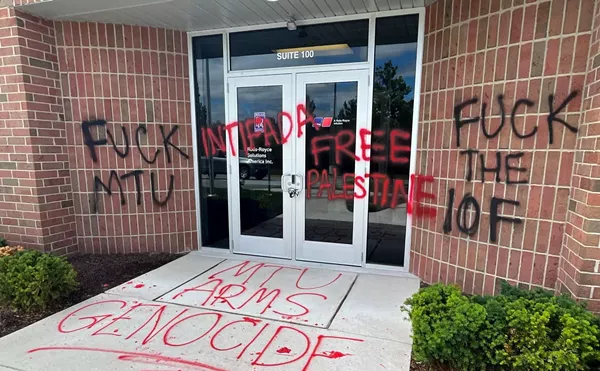
Audio By Carbonatix
[
{
"name": "GPT - Leaderboard - Inline - Content",
"component": "35519556",
"insertPoint": "5th",
"startingPoint": "3",
"requiredCountToDisplay": "3",
"maxInsertions": 100,
"adList": [
{
"adPreset": "LeaderboardInline"
}
]
}
]
Real estate expert Jim Saros didn’t mince words last week when he briefed Detroit City Council on the state of bankrupt mortgage corporation MCA.
"It is an absolute disaster," said Saros, who has been in the real estate business 25 years, specifically addressing blight in Detroit.
"But where there is disaster," he said, "there is opportunity."
The silver lining in this massive storm cloud
is a plan to reduce the presence of slum landlords by putting homes into the hands of people who are now renters or, failing that, giving the homes to community groups and others with a demonstrated commitment to neighborhoods.
Which is why Saros agreed to head a nonprofit that will manage 1,600 dilapidated homes while the courts determine who owns them – a task expected to take three to five years due to the labyrinth of title work the defunct mortgage company created before its collapse earlier this year.
"It’s like being a blind man in a dark room looking for a black cat that doesn’t exist," said Saros, trying to convey to the council just how bad the situation is.
Nonetheless, Saros and Paul Bernard, director of the city’s Planning and Development Department, presented a strategy to the nine-member body for renovating the homes and revitalizing the blighted neighborhoods where most are located – and said they would need a $9 million loan to make it happen.
Bernard said he convinced Saros last August to head the nonprofit set up by the city. Saros refused an offer to manage the homes when the county approached him three times earlier in the year. Bernard’s plan for the 1,600 rental properties and the city persuaded him. "I couldn’t be more thrilled," said Saros about taking on the task in an interview with the Metro Times, "because the plan makes sense."
Saros said he advised the county against taking on this project because it is out only about $1 million in delinquent taxes as a result of the bankrupt mortgage company. As for the city, he said, the problem could be devastating. Detroit is owed about $5 million in property taxes. Experts charged with MCA’s care while in bankruptcy court say so many homes in such poor shape pose a threat to the city’s tax base, housing market and census count.
Saros said he couldn’t walk away without lending his help. Like a true convert, he set out to convince the council to support the plan. It didn’t take much persuading. They knew of the looming disaster MCA’s downfall may have on Detroit, where it did 90 percent of its business.
The Southfield-based corporation specialized in providing mortgage loans to people with poor credit, and also owned and rented about 3,200 homes, in Detroit; the city has control of about half of them and is negotiating with creditors to gain control of the rest. About 300 of the 1,600 homes now under city control are vacant.
It is the people living in the homes the council must think of first, insisted Saros.
"Take your mind off finances for a minute," Saros advised when he and Bernard made their $9 million pitch. "There are people living in these homes," he said, homes that are not in compliance with the city’s own ordinances. "We need to make these homes safe."
To ensure that the thousands of tenants are safe, Saros ordered 3,000 smoke detectors and 1,300 carbon monoxide monitors. Saros explained that the city requires every home to have at least one smoke detector and two-story units must have two. Though the city ordinance does not require carbon monoxide monitors, Saros insists that each home have one. "If we avoid one tragedy," says Saros, "it’s worth it."
Within 30 to 35 days, he intends to have every home inspected. Each home is to be renovated and brought into compliance with city codes, which Bernard estimates will cost about $6 million including title searches. About 400 will need to be demolished, costing another $2 million.
The next step is to sell the homes, using the proceeds to repay the city. Tenants will have the first shot at purchasing them. If a tenant cannot afford to buy a home or isn’t interested, Bernard intends to sell them to community groups, block clubs, churches and others that prove to be truly invested in the city. These groups can help individuals purchase the homes or rent them at affordable prices, he said. "I am excited about this," said Bernard about working with other organizations, "because we can find ways to create partnerships."
Bernard intends to fold this project into the city’s neighborhood restoration program, for which $50 million in block grant money already has been designated. Detroit’s rundown neighborhoods will be assessed block by block. Brightmoor, for instance, is a blighted west-side community with 500 MCA homes. The area is also riddled with abandoned homes and vacant lots. The city will determine who the owners are. If they are tax delinquent, the city will aggressively try to recoup what is owed. Housing will be built on vacant lots; homes will be renovated and sold to get them back on the tax rolls.
The $9 million Bernard and Saros requested from the council is strictly for the MCA project. Fannie Mae, a federal mortgage association, and Detroit Renaissance both agreed to donate a total of $1 million for the project and National City Bank may pitch in $5 million for renovation. When the pair completed their presentation, the council all but pulled out their personal checkbooks.
"I feel like we should stand up and applaud and cheer," beamed Council President Pro Tem Maryann Mahaffey. "I can’t tell you with enough feeling how impressed I am with your overall view."
This was echoed by councilmembers Sheila Cockrel, who called the presentation, "excellent," and Kay Everett, who said she supported the plan "1000 percent" and would vote for it.
The city is expected to make a formal request for funding this week, which will be followed by a council vote.





